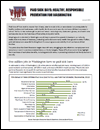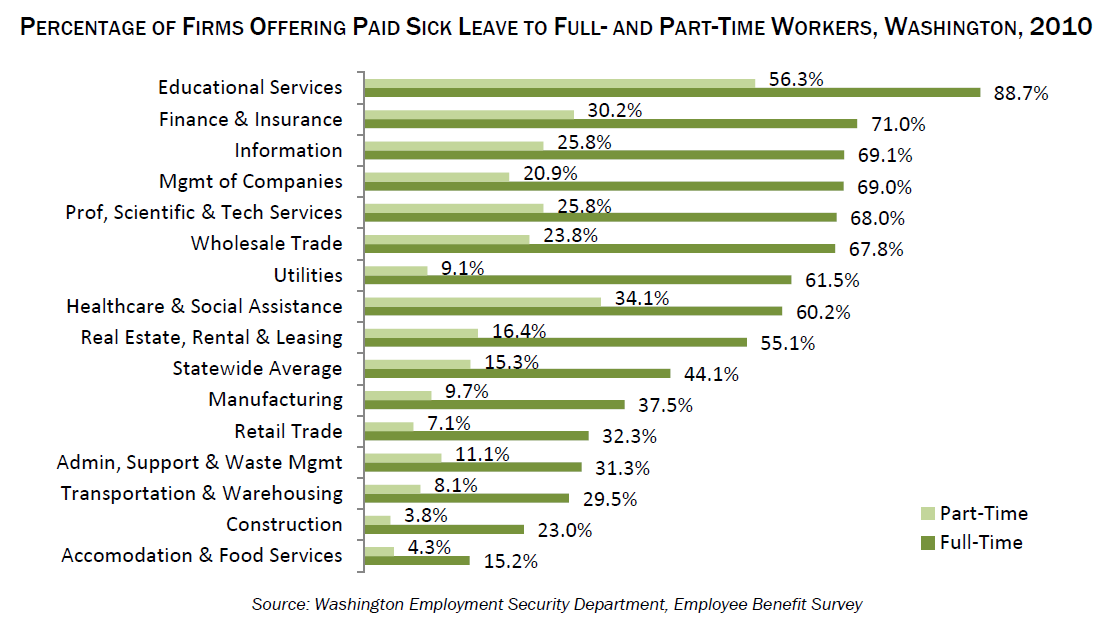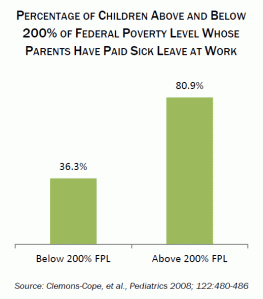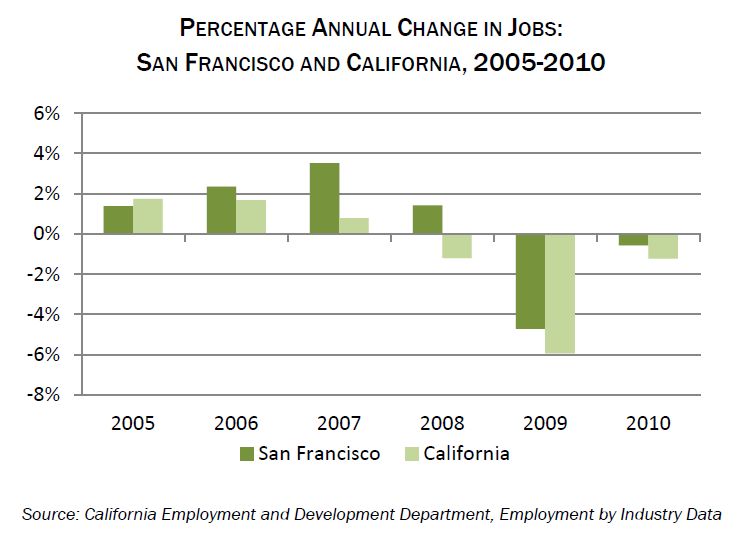Paid time off from work to recover from illness, care for a sick child, or see a doctor is a prerequisite for healthy workers and businesses, public health, family economic security, and even children’s success in school. Yet four in ten workers get no paid sick leave – including many restaurant, grocery, and health care workers who are on the front lines of food safety and public health.
Adopting such a standard in Washington would help to prevent the spread of disease in our schools, restaurants and places of business, protecting public and community health throughout the state. Further, paid sick leave is an essential building block for ensuring economic stability for all workers and their families.
The years since the Great Recession began have left many struggling to stay afloat as unemployment and reductions in work hours have wreaked havoc on family budgets. These difficult economic times highlight the importance of workplace benefits, including paid sick leave, in protecting individual and family economic security.
One million jobs in Washington have no paid sick leave
An estimated 1 million of Washington’s 2.8 million jobs do not offer paid sick leave, including nearly 170,000 in accommodation and food service, 167,000 in retail, and close to 93,000 in health services. People who work part time frequently do not qualify for paid leave and other benefits that are provided to full-time employees. These workers have significantly less access to paid sick days.
Risks to public health
Lack of paid sick leave contributed to the spread of H1N1 in 2009 and 2010, both in the workplace and in schools. Of the approximately 26 million employed Americans infected at the height of the pandemic from September through November 2009, only 18 million took time off from work. Sick workers are estimated to have infected 7 million of their co-workers.
Foodborne illness also has a major impact on health and the economy. According to the most recent data from the Centers for Disease Control and Prevention (CDC), every year one out of six Americans gets sick from food, resulting in 125,000 hospitalizations and 3,000 deaths. About 20% of cases can be traced to an ill food worker.
In Washington, all food service workers are prohibited from working around unpackaged food or beverages if they have symptoms of gastrointestinal disease or have been diagnosed with a disease that can be transmitted through food. However, since most restaurants do not offer paid sick time, ill employees often must choose between taking unpaid leave or going to work sick.
Impact on children’s health and education
Caring for a sick child or taking a child to see a health care provider during regular business hours is a significant problem without sick leave. A parent’s lack of paid sick leave can have a negative impact on the child’s health and school performance.
Studies show children recover more quickly from illness with a parent present. But as workers’ hours have been cut, many are now ineligible to receive workplace benefits – making it particularly challenging for employees to take time off from work when they need to recuperate or care for a sick child.
For 70% of school-age children and 60% of preschoolers in Washington, all parents in the family are in the work force. Rather than suffer loss of income, many employees feel their only option is to send a sick child to school or go to work while sick themselves. Older children are sometimes kept home from school to care for younger siblings when parents are not able to take time off from work, affecting the older child’s educational outcomes.
Children in families with lower incomes are much less likely to have a parent with access to sick leave than higher income children. A study of employed parents based on 2003 and 2004 data found that just 36.3% of children in families with incomes below 200% of the federal poverty level had a parent with access to paid sick leave, compared to 80.9% of higher income children.
Employers and paid sick leave
Policies that support work/life balance in general and flexible sick leave in particular result in better retention and measurable declines in employee turnover in all types of businesses. Multiple studies have found that providing paid sick leave results in higher morale and productivity, less absenteeism, and lower rates of turnover.
Turnover is particularly costly for businesses. Estimates of the direct cost of losing and replacing an employee range from 25% to 50% of annual pay for hourly workers, and much more for highly skilled employees. Many employers have long recognized that providing good benefits is essential to attracting and retaining good employees. Providing paid sick leave that is available for the care of sick family members has been shown to increase firm profits.
Paid sick leave policies around the country
Minimum standards of paid sick days have been adopted in three U.S. cities, including Seattle, where legislation was enacted in September 2011. San Francisco’s paid sick days ordinance has been in place the longest, since February 2007. Connecticut recently passed the first statewide paid sick leave law, and legislation is under consideration in other areas across the country. Other cities and states that are taking legislation into consideration include New York City, Massachusetts, and California.
In San Francisco, despite misgivings by some that the ordinance would add costs to employers and therefore reduce the number of jobs, the data show that the job market there has compared favorably to the surrounding counties and the state of California as a whole since the sick days law went into effect in 2007.
Conclusion
Lack of access to paid sick leave is a serious issue that affects the health and well-being of everyone who lives in, works in, or visits Washington. Without access to paid leave, workers in restaurants, grocery stores, daycares, health facilities and offices throughout the state make the decision whether to go to work or send their child to school sick – or lose a day’s pay.
Absent a law requiring the provision of paid sick leave, the majority of employers in restaurants and a portion of firms spread across all industries will continue not offering employees sick days, or significantly limiting access. Workers earning lower wages and their children are most directly affected by current practices, but the health and economic vitality of the whole community is negatively affected.
Replicable models of successful paid sick day ordinances are available from other areas. Utilizing these successful models from around the country, Washington can ensure a healthy and prosperous environment as we move out of the recession.
[Download the full report: Paid Sick Days – Healthy, responsible prevention for Washington]
More To Read
May 19, 2025
A year of reflections, a path forward
Read EOI Executive Director's 2025 Changemaker Dinner speech
March 24, 2025
Remembering former Washington State House Speaker Frank Chopp
Rep. Chopp was Washington state’s longest-serving Speaker of the House
February 11, 2025
The rising cost of health care is unsustainable and out of control
We have solutions that put people over profits




